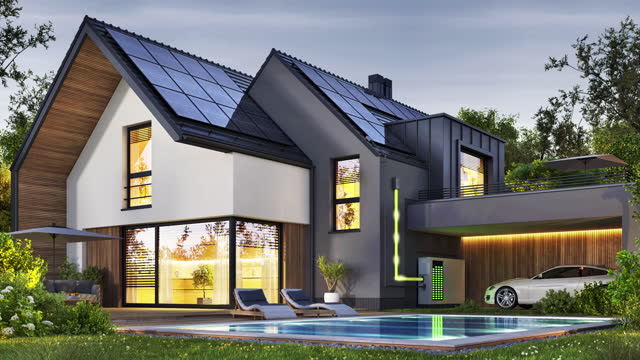Introduction
Home energy efficiency is a growing priority for homeowners looking to reduce their carbon footprint and save on utility bills. By implementing energy-saving strategies, you can make your home more environmentally friendly and cost-efficient. This article explores practical tips and solutions to enhance your home’s energy efficiency, ensuring that your living space is both comfortable and sustainable.
Understanding Home Energy Efficiency
What is Home Energy Efficiency?
Home energy efficiency refers to the ability of a household to use less energy while maintaining the same level of comfort and functionality. This can be achieved through various means, including better insulation, energy-efficient appliances, and mindful usage of resources. Enhancing your home’s energy efficiency not only lowers your energy bills but also reduces greenhouse gas emissions.
Why is Home Energy Efficiency Important?
Improving home energy efficiency is crucial for several reasons. It helps reduce energy consumption, which in turn lowers your carbon footprint and minimizes the impact on the environment. Additionally, energy-efficient homes are more comfortable, with fewer drafts and more consistent temperatures. Over time, the financial savings from reduced energy bills can be substantial, making energy efficiency a wise investment.
Key Strategies for Improving Home Energy Efficiency
Insulation and Sealing
Proper insulation is one of the most effective ways to enhance home energy efficiency. Insulating your attic, walls, and floors can prevent heat loss during winter and keep your home cooler in summer. Additionally, sealing gaps around windows, doors, and other openings with weatherstripping or caulk helps reduce drafts, further improving your home’s thermal performance.
Energy-Efficient Windows and Doors
Replacing old, drafty windows and doors with energy-efficient models can significantly reduce heat loss and gain. Look for windows with double or triple glazing and low-emissivity (Low-E) coatings, which reflect heat back into the room during winter and block it during summer. Energy-efficient doors with insulated cores also contribute to better home energy efficiency.
Upgrade to Energy-Efficient Appliances
Home appliances account for a significant portion of your energy consumption. Upgrading to Energy Star-rated appliances ensures that you’re using the most efficient models available, which consume less energy and reduce utility bills. Focus on major appliances like refrigerators, washing machines, dishwashers, and HVAC systems.
Smart Home Technology for Energy Efficiency
Smart home technology can help you manage and optimize energy usage more effectively. Smart thermostats, for example, learn your schedule and adjust the temperature accordingly, ensuring comfort while minimizing energy waste. Additionally, smart lighting systems allow you to control your lights remotely and set schedules to avoid unnecessary usage.
Efficient Heating and Cooling Systems
Heating and cooling systems are among the biggest energy consumers in a home. Regular maintenance of your HVAC system, such as cleaning or replacing filters, can improve its efficiency. Consider upgrading to a high-efficiency furnace or air conditioner, or even installing a heat pump, which provides both heating and cooling while using less energy.
Renewable Energy Sources
Incorporating renewable energy sources, such as solar panels or wind turbines, can drastically reduce your reliance on non-renewable energy. While the initial investment can be high, the long-term savings and environmental benefits make it a worthwhile consideration for those looking to maximize home energy efficiency.
Simple Daily Habits to Improve Energy Efficiency
Turn Off Unused Electronics
One of the easiest ways to improve home energy efficiency is by turning off electronics and appliances when they’re not in use. Devices left on standby still consume energy, so unplugging them or using smart power strips can make a significant difference.
Optimize Your Thermostat Settings
Set your thermostat to energy-saving temperatures: around 68°F (20°C) in winter and 78°F (26°C) in summer. Lowering your thermostat by just a few degrees in winter and raising it in summer can lead to substantial energy savings without sacrificing comfort.
Use Energy-Efficient Lighting
Switching to LED or CFL bulbs is a simple yet effective way to reduce energy consumption. These bulbs use significantly less energy than traditional incandescent bulbs and last much longer, making them a cost-effective option for lighting your home.
Conclusion
Maximizing home energy efficiency is a practical and impactful way to reduce your carbon footprint, save on utility bills, and create a more comfortable living environment. By implementing the strategies discussed in this article—from upgrading insulation to adopting smart home technology—you can make your home more sustainable and efficient. As energy costs continue to rise, investing in energy efficiency is not only good for the planet but also for your wallet.
FAQs
How can I tell if my home is energy-efficient?
An energy audit by a professional can help identify areas where your home is losing energy and suggest improvements. You can also look for drafts, check insulation levels, and monitor your energy bills for spikes in usage.
What is the most effective way to improve home energy efficiency?
Improving insulation and sealing gaps in your home are among the most effective ways to enhance energy efficiency, as they prevent heat loss in winter and keep your home cool in summer.
Are energy-efficient appliances worth the investment?
Yes, energy-efficient appliances consume less energy, leading to lower utility bills and reduced environmental impact. The initial investment is often offset by long-term savings.
Can smart home technology help with energy efficiency?
Absolutely. Smart thermostats, lighting systems, and power strips can optimize your energy usage, reduce waste, and provide greater control over your home’s energy consumption.
How much can I save by improving my home’s energy efficiency?
Savings vary depending on the improvements made, but homeowners can typically save up to 30% on energy bills by implementing energy-efficient upgrades and habits.
